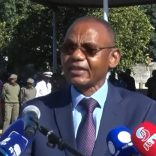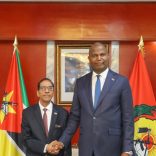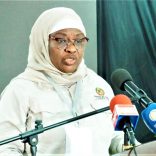Modernisation of the Armed Forces tops Mozambique’s national priorities – Government
Watch: Constitutional amendments can be improved – Nyusi

Facebook: Amizade Com Nyusi
Mozambican President Filipe Nyusi on Saturday urged the collaboration of all Mozambicans to improve the constitutional amendments on decentralisation that he placed last month before the country’s parliament, the Assembly of the Republic.
The amendments arise from the consensus reached in lengthy discussions between the government and the rebel movement Renamo – but they are not the last word in the matter.
Speaking at a rally in the town of Dondo, in the central province of Sofala, reported by the independent daily “O Pais”, Nyusi said he had again been in contact with Renamo leader Afonso Dhlakama by phone.
“We are continuing to talk about the decentralisation dossier”, he said. “I heard an interview the Renamo leader gave in which he said the decentralisation package is still a basic project which can be enriched”.
Since the draft amendments can still be altered, Nyusi urged Mozambican “to stop worrying about who is right or wrong about this project”.
If people thought this or that point in the amendments was not correct, they should say so clearly and openly, he added, “so that together we can solve the problem”.
The amendments caused surprise and anger in many quarters because, as currently worded, they abolish the direct election of mayors. Instead only the municipal assembly would be elected, and whichever party won a majority of votes in that election would appoint the mayor.
Similarly for provinces and districts. In the past provincial governors and district administrators were never elected. Now they would be – but only indirectly. The decentralization package envisages the election of provincial and district assemblies, and the party with most votes appoints the governor or administrator.
Among those who regard this as a bad idea is the Political Commission of the ruling Frelimo Party. Last week it issued a statement urging the Frelimo parliamentary group to ensure that mayors, provincial governors and district administrators are elected on a “head of the list model”.
The Political Commission appears to have taken the advice of one of the country’s senior experts in constitutional law, Teodato Hunguana, who suggested that the principle of “direct suffrage” could be safeguarded if whoever heads the list of a party’s candidates for the provincial, district or municipal assemblies automatically becomes the governor, administrator or mayor, if that party wins.
Under a “head of the list” system, citizens need only look at who was heading the party list to know who they were choosing for governor, administrator or mayor. Although there would only be one ballot paper, the voters would be voting simultaneously for an assembly and for the governor, administrator or mayor.
At the same Dondo rally, Nyusi urged everybody of voting age living in the 53 municipalities, to register as a voter ahead of October’s nationwide municipal elections. Voter registration begins on 19 March and ends on 17 May.
Nyusi stressed that only those who are registered can vote. He wanted to see a massive turnout at the voter registration, to improve the credibility of elections.
A peculiarity of the Mozambican system is that voters must re-register every five years. Voter cards issued in the past will not be valid for the October municipal elections. A voter card issued this year will be valid for the municipal elections and for the 2019 general elections, but not for any subsequent elections.
Senior Constitutional expert warns against abolishing direct election of mayors
Proposed constitutional changes give “limited powers” to provincial and district assemblies – CIP
Mozambique: Would constitutional changes represent democratic backsliding?












Leave a Reply
Be the First to Comment!
You must be logged in to post a comment.
You must be logged in to post a comment.